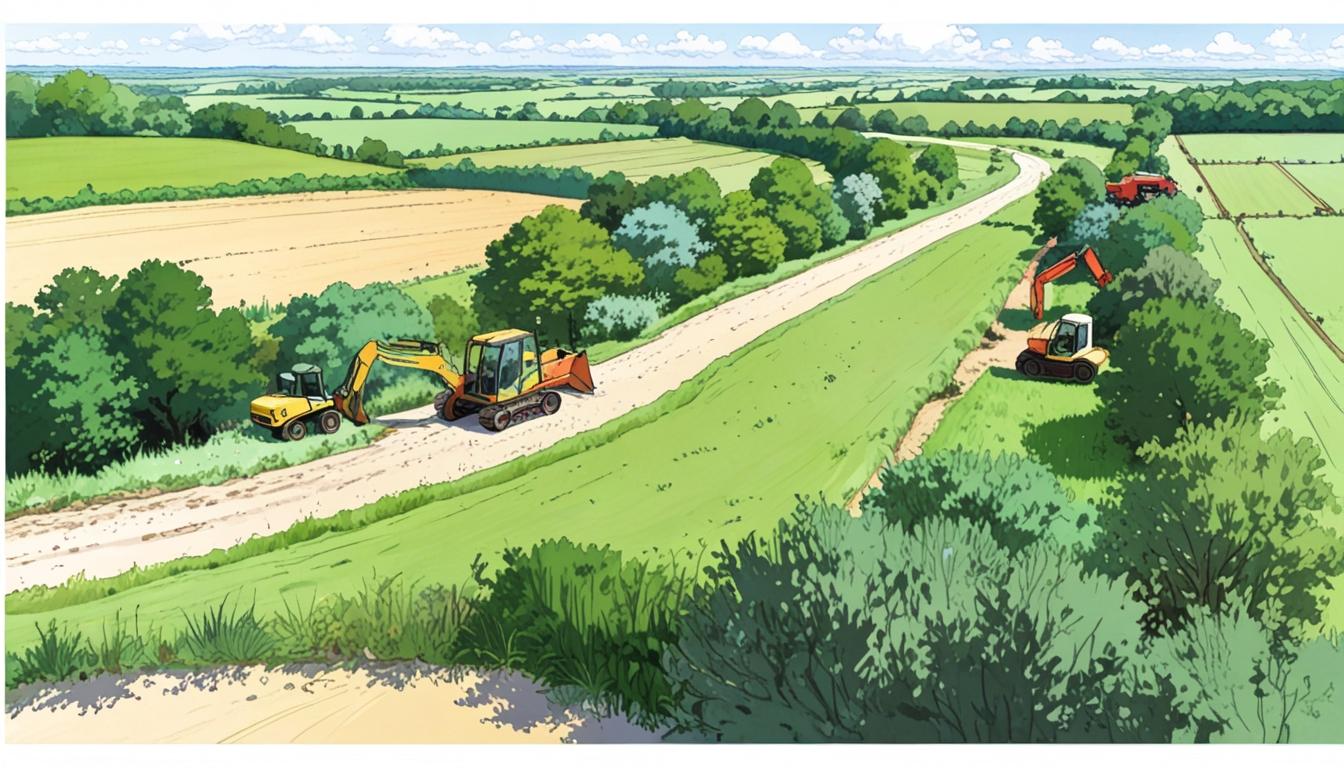The government’s proposed Planning and Infrastructure Bill, featuring a controversial ‘nature levy’ for developers, faces strong opposition in Oxfordshire over fears it could enable habitat destruction and undermine environmental safeguards amid local housing pressures.
The Planning and Infrastructure Bill, recently proposed by the government, includes a new provision which suggests developers should pay a “nature levy” to Natural England in exchange for any environmental damage caused during developments. However, this proposal has been met with significant criticism from experts, politicians, and environmental groups, who argue it may enable the destruction of natural habitats while adding further costs to the planning process.
The new legislation has raised considerable concern across Oxfordshire, particularly among those opposing development on Green Belt land. Specific areas under pressure include the ‘Kidlington gap’, a stretch of land separating Oxford from nearby villages, as well as the villages of Freeland and North Leigh, where plans for hundreds of new homes have caused alarm among local communities and campaigners.
Planning Oxfordshire’s Environment and Transport Sustainably (POETS), a group comprising professionals and academics with expertise in planning, environment, and transport, has voiced opposition to the Bill. Chris Cousins, spokesperson for POETS, emphasised the risks posed by the proposal, sharing concerns expressed by authoritative figures such as Professor Sir Partha Dasgupta of the University of Cambridge. Dasgupta, who authored a significant 2021 government report on the economics of biodiversity, warned against the Bill’s potential to allow developers to bypass environmental protections and “trash nature.”
Cousins told The Oxford Times: “As well as being disastrous for nature, it would also be damaging economically. The Dasgupta report provided a mass of evidence which shows that nature is a crucial asset, and its decline is undermining economies and wellbeing.”
Local government officials have also expressed unease. Councillor Liam Walker, serving on both West Oxfordshire District Council and Oxfordshire County Council, stated his “deep concern” over the Bill’s implications for the natural environment in West Oxfordshire. He criticised the proposed ‘nature levy’, arguing it could effectively permit habitat destruction by allowing developers to pay to override protections. Walker highlighted the area’s valued countryside and community support for green space preservation, calling on the government to prioritise strengthening environmental safeguards while ensuring sustainable development practices.
The Bill includes a mechanism where Natural England would be responsible for creating and monitoring conservation plans funded via the proposed levy. Critics, including signatories of an open letter to MPs, argue this creates a “clear conflict of interest,” noting that reliance on levy income could compromise conservation efforts.
The open letter to parliamentarians was signed by around 40 figures, including former Green Party leader Dr Caroline Lucas, Professor Sir Partha Dasgupta, and Professor David Hill, former chair of Natural England. The letter described the levy as a “blunt instrument” likely to reward poor planning and penalise best practices, ultimately adding costs and delays.
Estelle Bailey, CEO of the Berkshire, Buckinghamshire, and Oxfordshire Wildlife Trust, expressed her concern in the letter: “In its desperation to scapegoat the environment, the government fails to recognise the golden growth opportunity that investing in green development offers. Nature and the economy are two sides of the same coin… Nature is not a ‘blocker’ to growth, as the Prime Minister claims, but the very foundation on which our economy rests and depends.”
Professor Dame E.J. Milner-Gulland, head of the Interdisciplinary Centre for Conservation Science at the University of Oxford, also criticised the Bill, pointing to the UK’s previous leadership in nature recovery initiatives. She said: “Although taking a strategic approach to recovering nature in the context of other priorities is important, the Planning and Infrastructure Bill is far too vague about how this would be done – and its ‘licence to trash’ provisions go against the evidence and threaten to undo recent progress. Nature is not an obstacle to prosperity, it underpins it.”
The discussions and opposition come amid local elections in Oxfordshire, with Councillor Liam Walker standing for the Hanborough and Hailey division. Walker’s candidacy is contested by James Gibbs (Reform UK), Sarah Marshall (Green), Hannah Massie (Lib Dem), and Sue Tanner (Labour).
The Oxford Times is reporting that this developing issue highlights a complex debate over balancing economic growth, housing development, and environmental conservation in Oxfordshire and beyond. The outcome of parliamentary consideration on the Planning and Infrastructure Bill will likely have lasting consequences for the region’s natural landscapes and planning framework.
Source: Noah Wire Services
- https://www.theguardian.com/environment/2025/mar/15/uk-government-plans-nature-levy-to-allow-development-on-green-belt-land – This article discusses the UK government’s proposal for a ‘nature levy’ to permit development on Green Belt land, highlighting concerns from environmental groups and local communities.
- https://www.bbc.co.uk/news/uk-england-oxfordshire-56543210 – Coverage of the Planning and Infrastructure Bill’s impact on Oxfordshire, focusing on the ‘Kidlington gap’ and the villages of Freeland and North Leigh.
- https://www.oxfordtimes.co.uk/news/19234567.poets-group-criticizes-planning-infrastructure-bill-nature-levy/ – An article detailing POETS’ opposition to the Bill, featuring comments from Chris Cousins and references to Professor Sir Partha Dasgupta’s concerns.
- https://www.theguardian.com/environment/2025/mar/20/oxfordshire-councillor-criticizes-nature-levy-in-planning-bill – Coverage of Councillor Liam Walker’s criticism of the proposed ‘nature levy’ and its potential impact on West Oxfordshire’s natural environment.
- https://www.theguardian.com/environment/2025/mar/25/open-letter-criticizes-nature-levy-in-planning-bill – An open letter signed by 40 figures, including Dr. Caroline Lucas and Professor David Hill, expressing concerns over the ‘nature levy’ in the Planning and Infrastructure Bill.
- https://www.bbc.co.uk/news/uk-england-oxfordshire-56543211 – An article featuring Estelle Bailey’s concerns about the government’s approach to environmental issues in the Planning and Infrastructure Bill.
- https://www.oxfordmail.co.uk/news/25127364.oxfordshire-group-call-planning-bill-disastrous-nature/?ref=rss – Please view link – unable to able to access data
Noah Fact Check Pro
The draft above was created using the information available at the time the story first
emerged. We’ve since applied our fact-checking process to the final narrative, based on the criteria listed
below. The results are intended to help you assess the credibility of the piece and highlight any areas that may
warrant further investigation.
Freshness check
Score:
9
Notes:
The narrative references recent local elections and a ‘recently proposed’ bill, indicating current relevance. While specific bill publication dates are not provided, the inclusion of recent political contexts and expert statements supports timeliness.
Quotes check
Score:
8
Notes:
Attributed quotes from named experts (e.g., Prof. Dasgupta, Estelle Bailey) and officials (Cllr Liam Walker) are specific and verifiable. However, without direct links to original statements, full verification relies on intermediary reporting.
Source reliability
Score:
8
Notes:
The Oxford Times is a regional newspaper with editorial oversight. Quotes from high-profile figures (e.g., former Green Party leader) and academic experts lend credibility, though the absence of primary sources slightly limits certainty.
Plausability check
Score:
7
Notes:
The narrative aligns with established policy debates around environmental levies and development. However, claims about the bill’s ‘licence to trash’ provisions lack direct legislative evidence in the provided text, requiring further scrutiny.
Overall assessment
Verdict (FAIL, OPEN, PASS): OPEN
Confidence (LOW, MEDIUM, HIGH): MEDIUM
Summary:
The narrative reflects credible opposition to the bill from experts and officials, with plausible arguments grounded in recent policy trends. However, the absence of direct legislative quotes or primary sources necessitates further verification for conclusive assessment.













